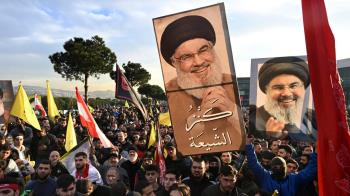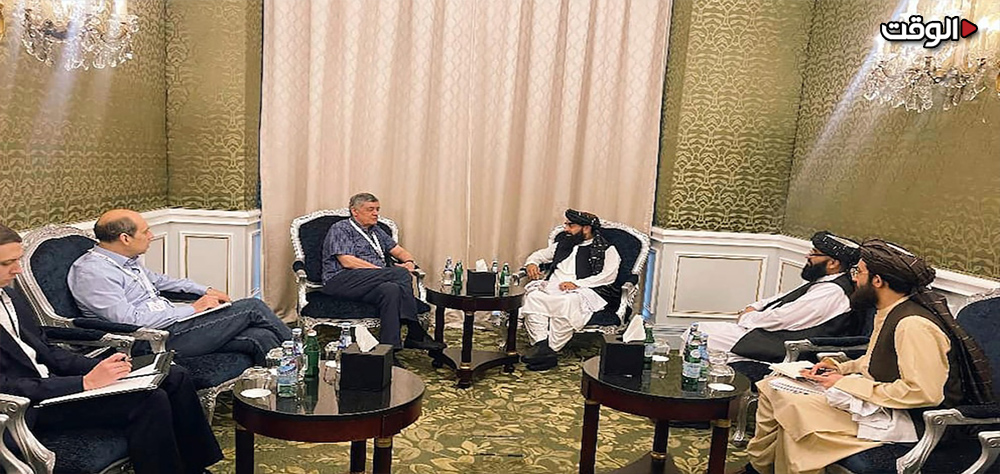Alwaght- The third round of Afghanistan summit with the participation of representatives of countries and the Taliban government was held in Doha, Qatar. Representatives from 25 countries and 5 international organizations discussed behind closed doors economic conditions and fighting against drugs in Afghanistan.
Unlike the previous meetings, in the Monday meeting the Taliban's Zabihullah Mujahid headed a 6-member delegation. From Iran, Hassan Kazemi Qomi, the special envoy to Afghanistan, joined the meeting. Before his visit to Doha, the Iranian diplomat in an X post said: "Our goal is to clarify positions, convey Tehran's concerns about Afghanistan, and explain humanitarian policies of the Islamic Republic of Iran regarding the [Afghan] nationals in the country to the officials of the United Nations and the countries participating in the meeting."
The UN and the representatives of countries also to hold a separate meeting with representatives of the civil society of Afghanistan on Tuesday. Mujahid on Monday in a press conference said internal affairs of Afghanistan will be raised in Doha conference. He added that the conference sheds light on the economic matters, banking restrictions on Kabul, and the achievements of Taliban rule.
Alwaght held an interview with Ismail Bagheri, an Iranian expert of Afghanistan affairs for elaboration on the third Doha meeting on Afghanistan.
Referring to the record of holding Doha meetings, Mr Bagheri said that these meetings on Afghanistan date back to the 2020 agreement between the Taliban and the US. One of the terms of this agreement was the US interaction with the group, which is not referred to in the agreement. After inking the agreement, the two had cooperation which is related to a confidential appendix to the deal. So far, two meetings have been held, and in both of them, the UN acted as the political arm of the US, with the most important goal is persuading the Taliban to cooperate with the UN in such matters as formation of an inclusive government, peace, and women education.
Mr Bagheri described boosting the interaction with the Taliban as the most important focus of this meeting. In the third meeting, he said, efforts were made to increase the interaction among the Taliban, the United States and the United Nations. The blocking of Afghanistan's assets is also for the purpose of determining Afghanistan's representation, which, of course, was decided in the previous (second) round. The representatives of the United Nations and the United States were able to persuade the Taliban to participate in this round by showing flexibility and accepting their preconditions, such as the non-participation of anti-Taliban women in this meeting and not raising the issue of special representative of the contact group. One of the goals of the United States in this meeting was to convince the Taliban to accept the special representative, but it failed. The second was to highlight the role of the American-swayed United Nations in Afghanistan. The Americans are trying to use the capacity of the United Nations to justify their actions in the Afghanistan issue.
The expert added that another reason for emphasis on Doha meetings mainly by the West is to take on a rival regional plan in which Iran holds the initiative. Albeit Russia and China are working with Iran on this plan. The point of the regional plan is forming a regional contact group the first meeting of which was held in Kabul. The second meeting was held in Tehran last month.
Mr Bagheri added that recognition and legitimacy was the main demand of the Taliban in this meeting. He added that the US intends to implement its agenda in Afghanistan which includes a range of security and political goals. Taliban wants recognition and contacts with the world countries. Mujahid met representatives of China, Russia, and other countries, including Germany and somehow worked for gaining legitimacy. So, the group still does not walk back from its demands.
Mr Bagheri also highlighted the political power of the Taliban, adding that we should take into consideration the fact that the Taliban eliminated or marginalized other political factions and has turned into a key actor in Afghanistan. Just contrary to the public presumption that sees the Taliban as bigoted and radical, they have strongly grown as politicians, to an extent that both the East and the West want to interact with them. They have managed to polarize and take advantage.
We can observe the most important sign of Taliban's independence of acting in their dealing with Pakistan that for years was the group's godfather but with which these days they are at odds over such matters as borders, water resources, and migrants, Mr Bagheri said.
In his closing comments, Mr Bagheri pointed to the Western double standards regarding Afghanistan. He said that Afghanistan’s assets are $10.5 billion, of which about $3.5 billion are blocked. Every year, the world community has raised worth of $4 to 5 billion for the Taliban government, but the West has used these aids to dig influence in the Taliban government and increase its field information on it.



























